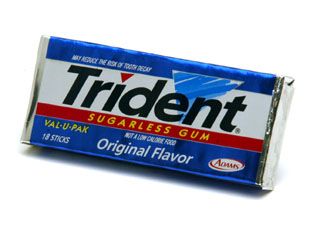Who Was the Fifth Dentist — That Didn’t Recommend Trident?


In 1964, the Warner-Lambert Company earned a patent for a brand new product — sugarless chewing gum. The company saw this as a breakthrough; for the first time ever, gum chewing could be enjoyed without putting your teeth at risk of decay. From day one, the marketing plan for this new product was centered on this fact. Even the name of their first sugarless gum reflected this. Trident, as the product was then and is still now called, is a combination of “tri” and “dent.” Tri, as a corporate fact sheet (pdf) explains, is a reference to the gum’s “three enzymes [designed] to combat the formation of tartar on teeth” while “dent” is short for “dental.”
As the years ticked by, Warner-Lambert looked for new ways to make the dental safety of the product more prominent. In 1976, they backed up their claim with a survey of experts: the dentists themselves. The survey results seemed great for Warner-Lambert, at least if you go by their ad campaign: 80% of dentists surveyed seemed to not only be okay with Trident, but in some way endorse it. Here’s one ad from just a few years ago, and the claim, while presented in a tongue-in-cheek way, is pretty straightforward: “four out of five dentists would recommend Trident for their patients who chew gum.”
That’s a bold claim. Is it right?
Mostly.
To start, let’s look at the claim again. Four out of five dentists aren’t claiming that their patients should chew gum; they’re only recommending Trident for those who chew gum in the first place. (Trident, to its credit, doesn’t try to hide this caveat.) And that’s an accurate reflection of how Warner-Lambert approached the topic forty years ago. The Straight Dope explains:
The Warner-Lambert Company, makers of Trident sugarless gum, commissioned a market research firm to survey dentists in July 1976. The research people came up with a list of 1,200 dentists who were supposed to represent a cross-section of their profession. [ . . . ] Sugarless gum won with 85 percent.
That’s 17 out of 20, but four out of five sounds better — and as Trident rounded down, that’s also fair. So far, so good.
But there were two problems with the ad above. First, the original survey didn’t ask about Trident specifically, but about sugarless chewing gum generally. And again, in fairness, early Trident ads like this one said exactly this — “four out of five dentists surveyed recommend sugarless gum for their patients who chew gum.” So Trident took a few liberties as the years went on.
And second, then there’s the issue of the fifth dentist — or, more accurately, the other 15% of those surveyed. What did they recommend? It turns out that the survey gave the panel three options — would you recommend sugarless gum, sugared gum, or that your patients halt the gum-chewing habit altogether? The Straight Dope cuts to the chase: “Fact is, the fifth dentist usually recommended no gum at all.” That is, they advised their patients against chewing gum — even if those patients were already gum-chewers. As the Straight Dope observed, that’s “not the kind of advice a chewing-gum company want[ed] to play up real big.”
So, they haven’t. And Trident’s owners — Warner-Lambert is long gone — apparently never asked the obvious follow-up question: “Is gum chewing good for your patients?” (or something to that effect). So while four out of five dentists may have told his or her patients to opt for sugarless gum over the sugared stuff, the fifth may have been the one giving closer to complete advice.
Bonus fact: As it turns out, that 15% of dentists may have been right in 1976, but now, they’ve likely been proven wrong. Some sugarless gums — including Trident — contain a compound called xylitol. Xylitol is an anti-microbal, fighting against tooth decay — even the American Dental Association endorses that finding. But you have to chew a lot of gum to get the benefits — two if not three pieces of gum a day, according to a report by NPR. That’s a lot of gum chewing, but it’s not unheard of; per the same NPR report, children in Finland “have been chewing xylitol gum for years as part of a public health initiative to reduce cavities,” with some demonstrably positive results. (Just be careful with the gum around dogs; xylitol is toxic to them.)
From the Archives: Nuclear Teeth: How mailing baby teeth to a researcher helped Americans figure out the harm caused by nuclear fallout.
Related: Trident.
